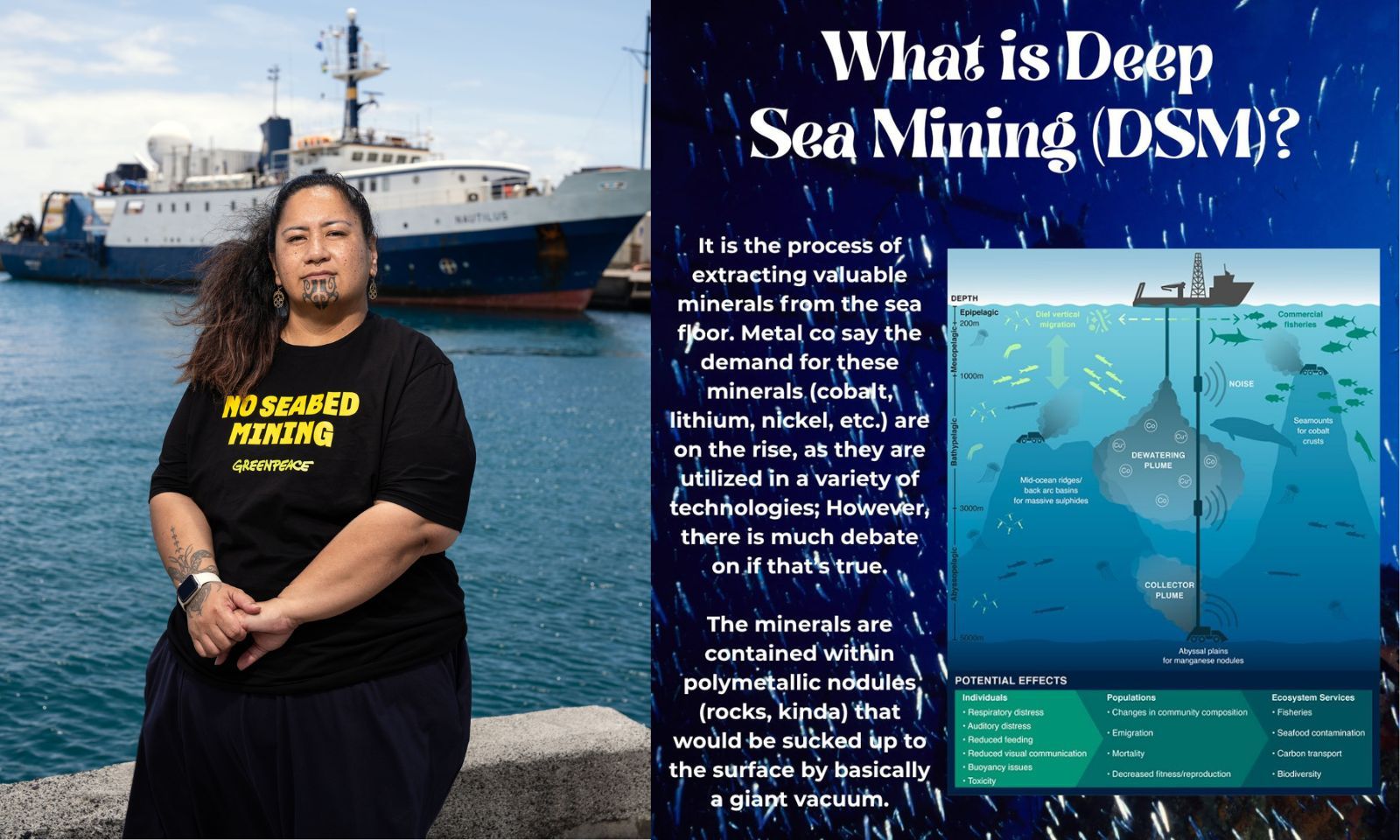

Cook Islands activists peacefully confront the US-funded Nautilus vessel in Rarotonga, holding a “Don’t Mine the Moana” banner to protest against deep sea mining in Pacific waters.
Photo/Supplied
Cook Islanders confront US-funded vessel over seabed mining threat
Activists warn that deep sea mining threatens Pacific oceans, Indigenous rights, and future generations across the region.


‘Words have power’: Pacific tolerance for on-air slurs hits record low



Niue PM calls for Realm leaders to discuss constitutional ties

‘Words have power’: Pacific tolerance for on-air slurs hits record low


Four Cook Islands activists in kayaks confronted a United States-funded exploration vessel as it returned to port in Rarotonga on Wednesday, holding a banner that read “Don’t Mine the Moana.”
In a bold act of oceanic resistance, the group targeted the Nautilus, a research ship that had spent the past three weeks surveying the sea floor for valuable mineral deposits.
Critics fear the expedition is a fast-tracking of deep sea mining in the Cook Islands and across the Pacific. The protest comes amid growing Pacific opposition to seabed mining, a controversial and largely untested industry that threatens fragile marine ecosystems and Indigenous sovereignty.
Activists warn of ‘extractive colonialism’
The vessel’s expedition, conducted in partnership with the Cook Islands government and funded by the United States’ National Oceanic and Atmospheric Administration (NOAA) Ocean Exploration Cooperation Institute, is being criticised as the latest example of powerful nations pushing extractive industries in the Pacific under the guise of scientific exploration.
“Right now, global superpowers like the US are vying for control of deep sea minerals throughout the Pacific, in an attempt to assert their military might,” Louisa Castledine, Cook Islands activist and spokesperson for the Ocean Ancestors collective, says.
“Seabed mining will lead to the destruction of our home environments and put our Indigenous rights, cultural ways of living, and wellbeing at risk.”
Castledine called the Nautilus expedition “a corporate takeover of our ocean”, saying Indigenous voices are being sidelined in decisions about the future of the moana.
What is deep sea mining and why is it controversial?
Seabed mining involves extracting mineral-rich nodules, often from deep, dark, and ecologically delicate areas of the ocean floor. These nodules contain rare earth metals used in batteries and high-tech devices.
Supporters say mining the ocean floor is essential for the world’s green energy transition. But scientists warn it could cause irreversible harm to marine ecosystems, many of which remain poorly understood.
So far, no country has started commercial-scale seabed mining, and Pacific nations have become a flashpoint in the global debate over whether it should begin at all.
In August, the Cook Islands and the US announced a formal partnership to develop seabed mineral resources. Two of the three current exploration licences in Cook Islands waters are held by US companies.
A senior official from the Cook Islands Seabed Minerals Authority recently described the Nautilus expedition as a “first step in our collaboration” with the United States.

Louisa Castledine of the Ocean Ancestors collective says deep sea mining poses an existential threat to Pacific cultures, livelihoods, and the sacred ocean environment. Photo/Supplied
Greenpeace joins Pacific pushback
Greenpeace Aotearoa is supporting Wednesday’s protest, comparing the growing movement to the historic Pacific resistance to nuclear testing.
“Just like Greenpeace stood with Pacific Peoples against nuclear testing, we will stand with them now against this reckless industry,” Juressa Lee, a Greenpeace campaigner, says.
“The Nautilus is doing exploration for the US, but Pacific Peoples will not be sidelined by corporations and powerful countries that try to impose this new form of extractive colonialism on the region.”
Lee highlights the parallels between struggles in the Cook Islands and Aotearoa, where iwi and communities are battling a proposed seabed mining project off the coast of Taranaki.

Juressa Lee, a seabed campaigner at Greenpeace Aotearoa, seen close to the Nautilus in Rarotonga. Photo/Supplied
Global scientific and political momentum against mining
Scientists and governments are increasingly calling for caution. More than 940 marine experts from 70 countries have urged a precautionary pause on seabed mining, warning of unknown impacts on ocean biodiversity.
And resistance among Pacific states is strengthening. Forty countries, including Palau, Sāmoa, Vanuatu, and Tuvalu, have called for a moratorium or pause on seabed mining. On Wednesday, Antigua and Barbuda and Romania added their support.
The protest in Rarotonga is the latest sign that opposition is not just diplomatic, it is grassroots and growing.
“As Indigenous Peoples and custodians of the ocean, we say NO to seabed mining,” Castledine says. “We’ve endured environmental and political injustices before. We won’t stand by and let it happen again.”
The Nautilus is expected to deliver its research findings to the US and Cook Islands officials. Activists fear the data will be used to justify commercial extraction in Cook Islands waters and potentially, the rest of the Pacific.
For now, the waters remain unmined. But with geopolitical interest mounting, Pacific communities believe the time to draw a blue line is now.